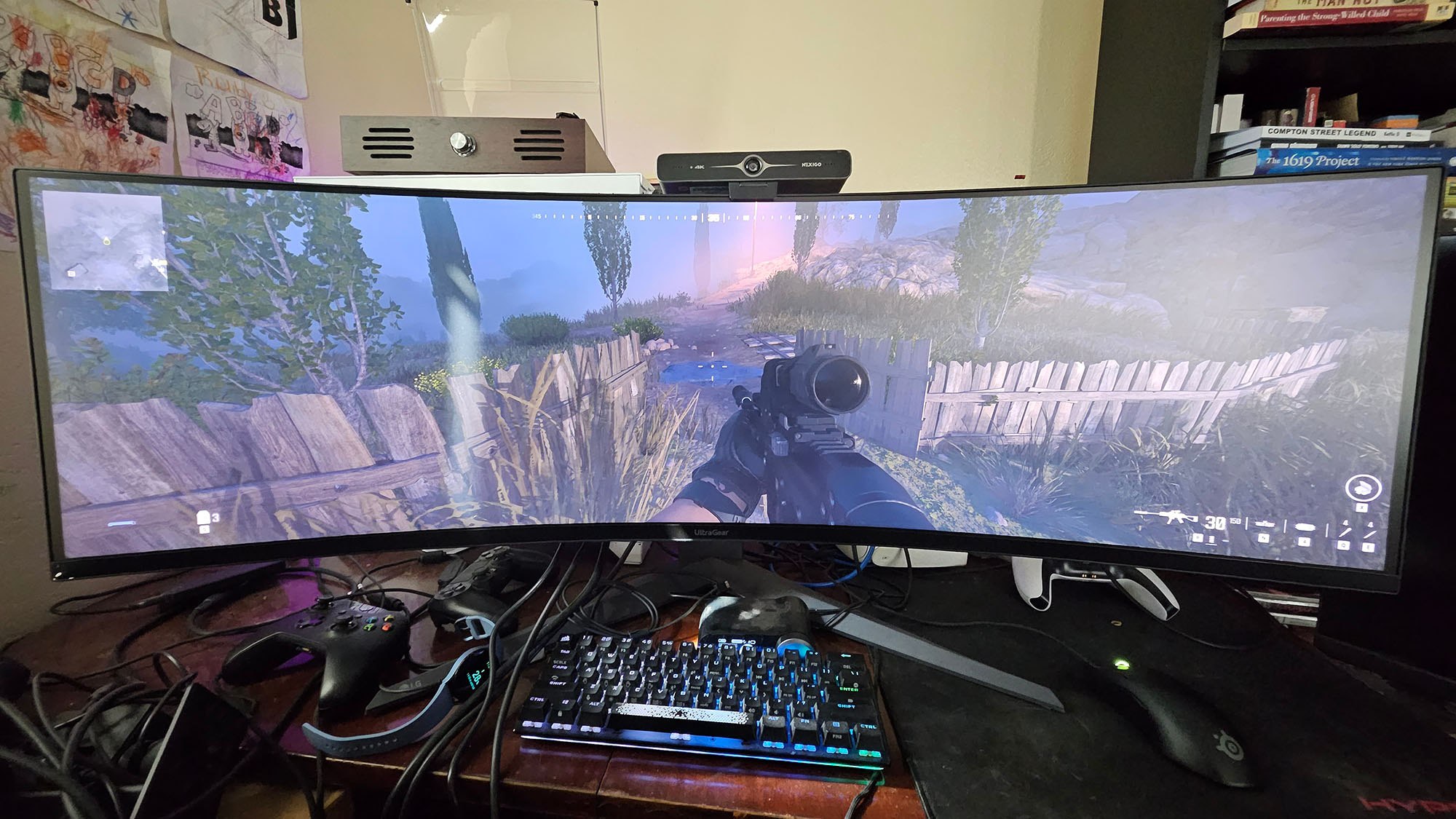
LG UltraGear 45GR75DCB: Two-minute review
The LG UltraGear 45GR75DCB is a special monitor, to say the least, and is effectively a new benchmark for the best ultrawide monitors thanks to its phenomenal balance of price, performance, and features.
The 45GR75DCB stretches its ultrawide display up from the usual 3,840 x 1,440p resolution up to 5,120 x 1,440p (32:9, rather than the more typical 21:9), and spreads that across just under 45 inches (44.5 to be precise) of display running up to 200Hz.
Then there are various features ranging from KVM capabilities for use across various devices, AMD Freesync Premium Pro compatibility, and more. Most importantly, the 45GR75DCB lacks the incredibly high $2,000 launch price tag of the LG UltraGear 38GN950, instead coming in at $799. This makes the 45GR75DCB one of the best gaming monitors currently available in its class.
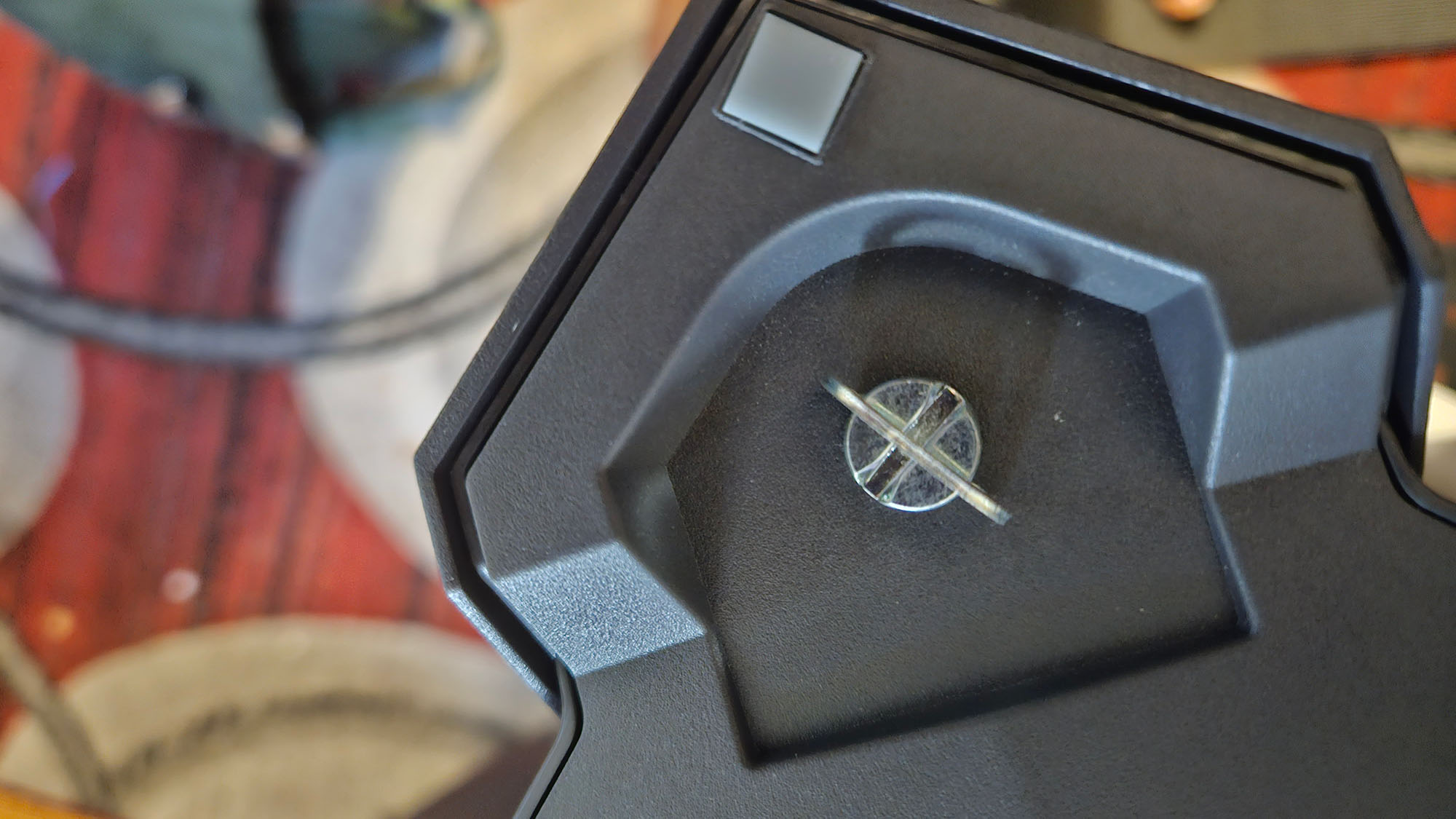
The LG UltraGear 45GR75DCB has a simple set-up out of the box. Three parts need to be connected including the base, stand, and display itself. The base has an easy screw at its bottom that connects to the neck.
Once that’s done, the neck connects to four slots on the display’s back. Weight distribution feels pretty even during setup so putting all the parts of the 45GR75DCB together wasn’t difficult. Power is supplied by a slightly enlarged brick that connects to a jack in the rear near a larger collection of ports.
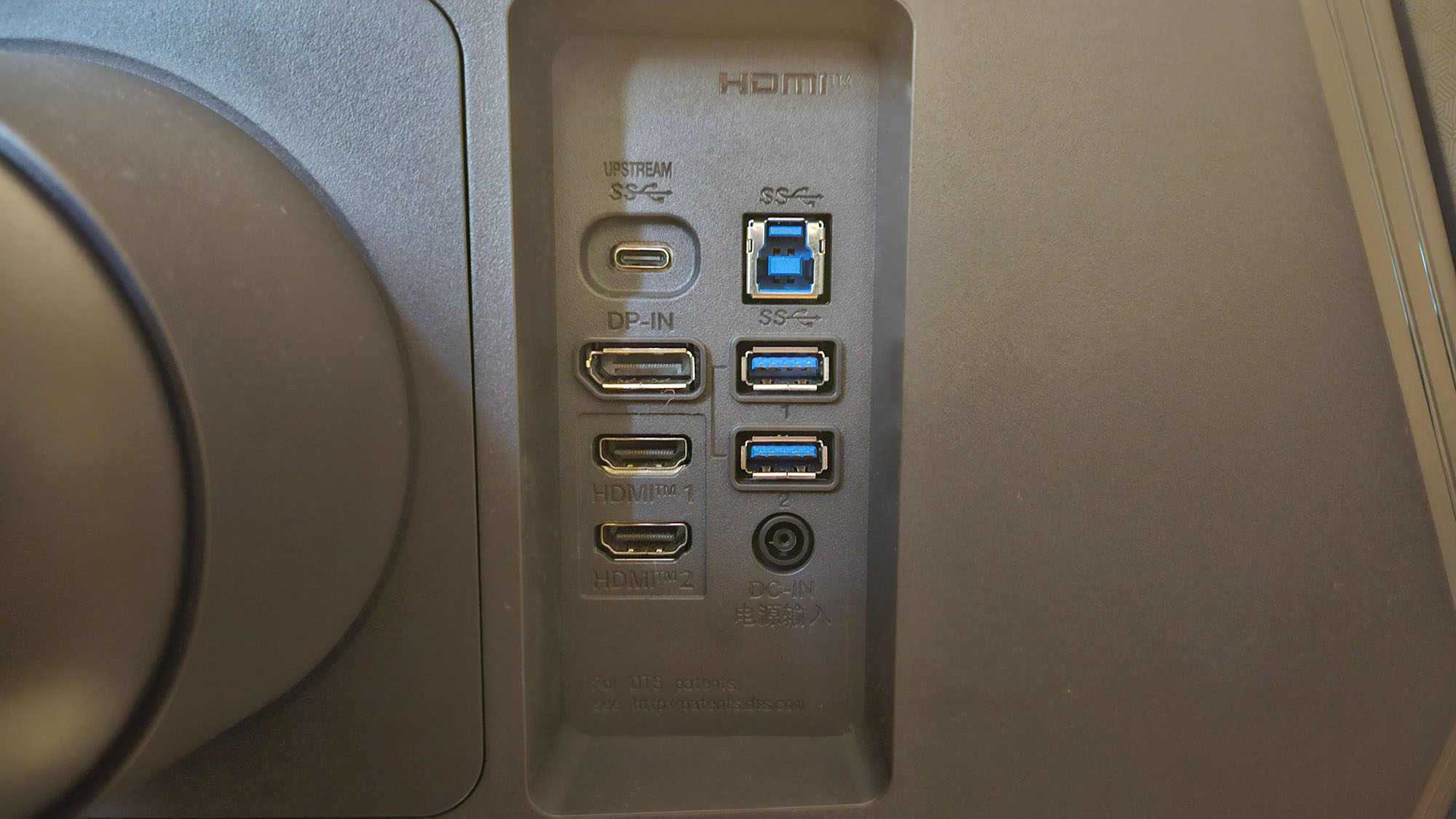
The ports sit on the right side of the back panel directly next to the display neck. In this section are two HDMI ports alongside a singular DisplayPort, USB-C port, USB-B, and two USB-A ports for KVM capabilities.
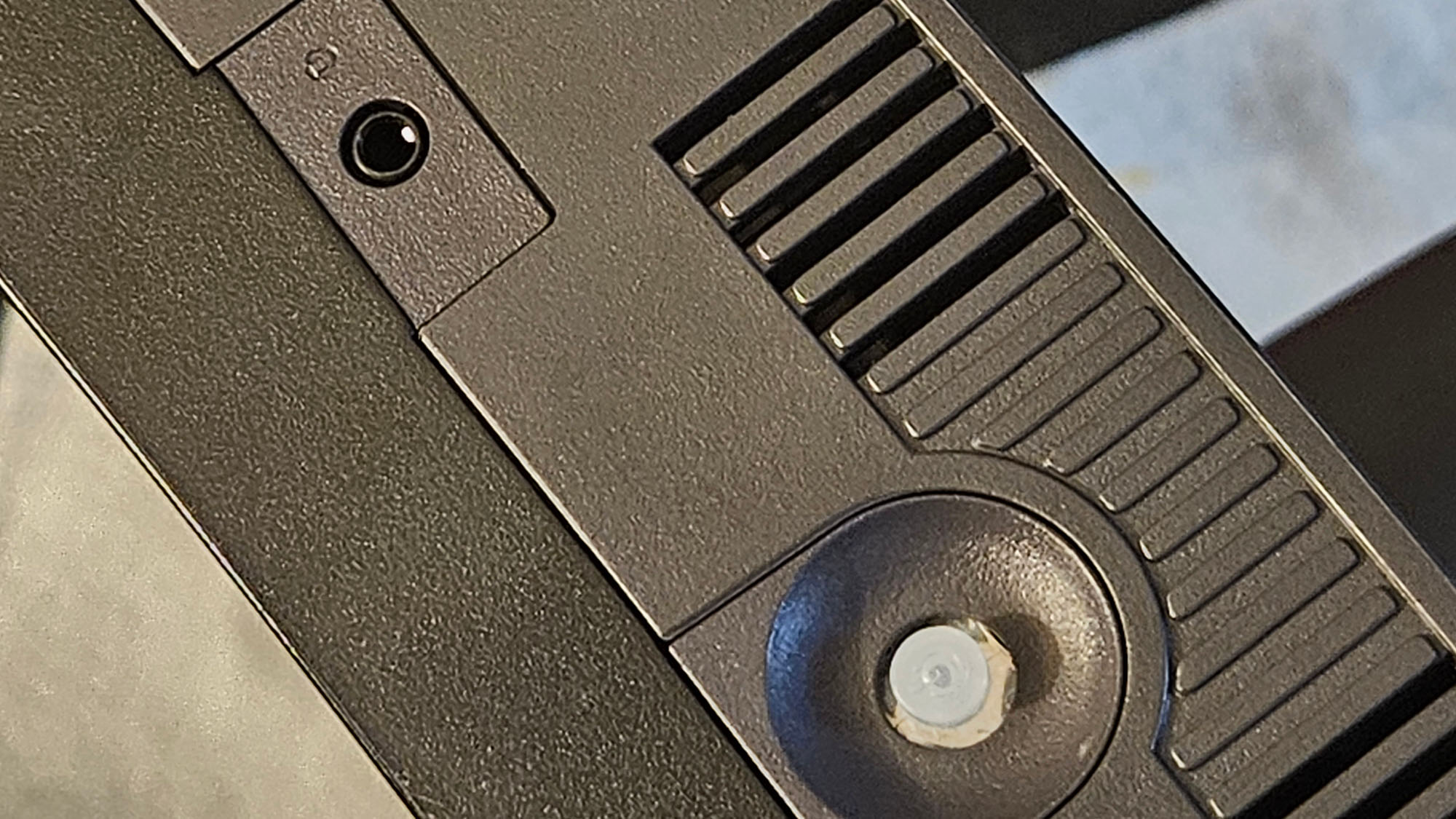
At the panel bottom near the power button/menu stick is a 3.5mm audio jack that also features DTS Headphone:X for virtual surround sound. It’s incredibly easy to navigate system menus with the stick as the user interface is pretty snappy as well. Unfortunately, there aren’t any internal speakers so headphones or external speakers are going to be mandatory.
When it comes to aesthetics, it won’t win any awards for beauty as it's more about function over form. For a small bit of oomph, there is an UltraGear logo on the back panel and that’s about it. The bezels are thin enough not to interfere with display real estate due to its 3-sided virtually borderless design.
Thankfully, the feet of the base don’t spread out wide enough to be a nuisance, which is great. The 45GR75DCB also doesn’t have any of the customizable lighting of the 38GN950 but that’s fine, and some might even see that as a positive. Though it’s impossible to rotate the 45GR75DCB vertically to get into portrait mode, there are enough height, tilt, and swivel adjustment ranges for a comfortable setup.
There are plenty of features that come packed in the LG UltraGear 45GR75DCB that add to various levels of functionality from creative work to pure gaming applications. The USB-C port allows for various functions including video and data transfer alongside power delivery up to 90W.
There also are a slew of various picture-by-picture and picture-in-picture modes as well as the splitting the monitor between two 2560 X 1440p displays. Multitasking is taken even further through KVM capabilities which allows a single mouse and keyboard input over two devices. This is perfect for gamers who want to stream content through one monitor and set of inputs.
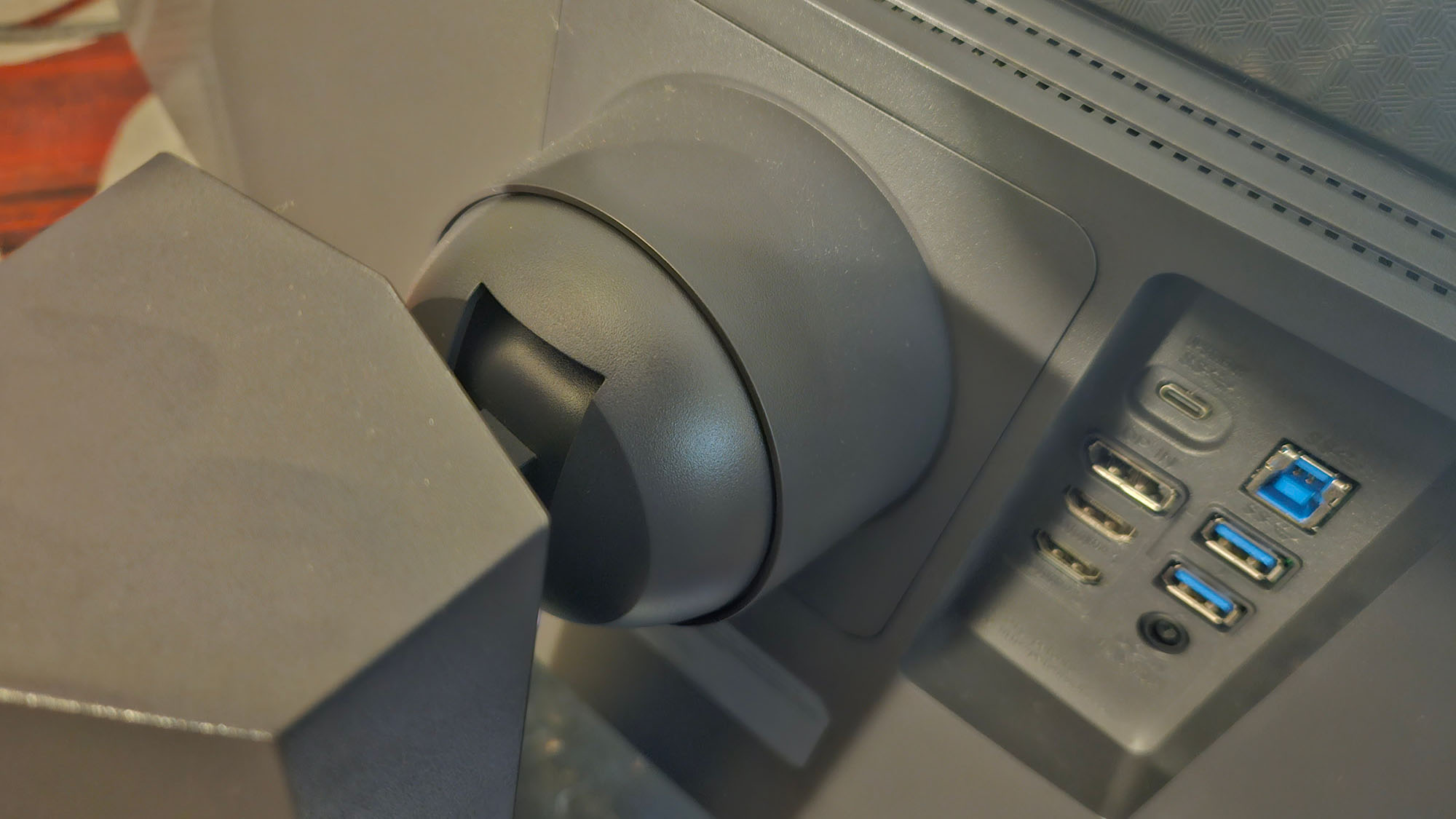
When it comes to more image quality-focused features, the 45GR75DCB has a 1500R curve and 178° viewing angle. The 44.5-inch VA panel produces true-to-life images and videos, boasting 1.07 billion colors and VESA DisplayHDR 600 certification for high-dynamic range, encompassing 95% of the DCI-P3 gamut. Additionally, it offers a 3000:1 contrast ratio and a brightness of 400 nits among its standout features.
Real-time frames per second data can be splashed across all four corners of the display through an FPS Counter. Though the accuracy of the counter is a bit wonky during our test, it’s a great resource to keep up with fps data without using a third-party app that could take away system resources. Shooter fans looking to become as accurate as possible have several choices of a center-display crosshair for improving precision and accuracy. Though the 45GR75DCB doesn’t have external speakers, having DTS Headphone:X certification for virtual surround sound is a phenomenal plug-in-play feature.
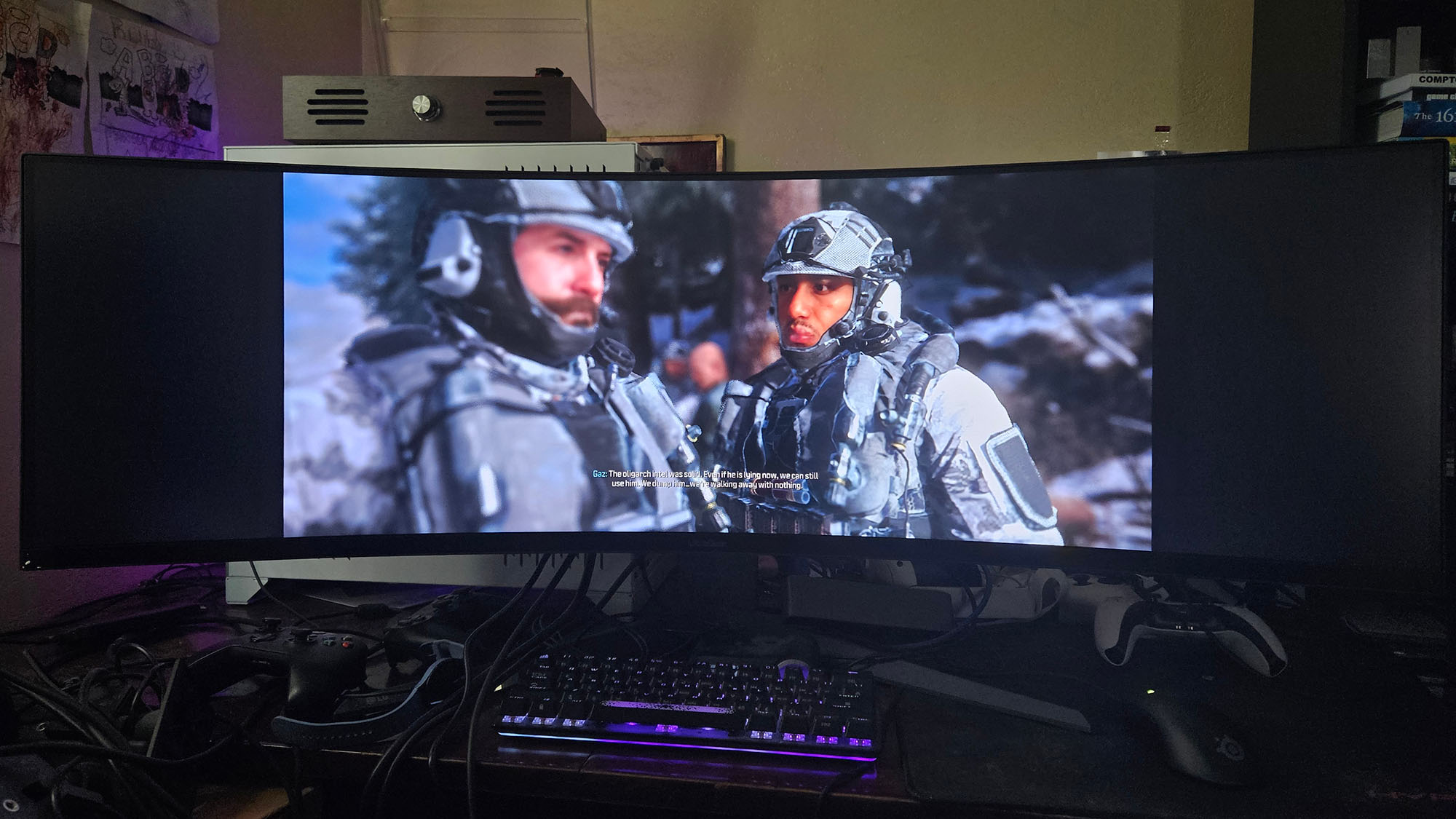
General gaming performance on the LG UltraGear 45GR75DCB is pretty fantastic despite the wide visual real-estate. High frame rate games like Doom Eternal, Fortnite, and Counter Strike 2 definitely make the most of the blistering fast 200Hz display. Input lag while playing those games was non-existent thanks to its 1ms (GTG) response time, as well. Moreover, its compatibility with multiple variable refresh rate standards, including AMD FreeSync Premium Pro, allows users to seamlessly apply the suitable variable refresh rate function to any PC or console.
Fans of games including Forza Motorsport, Microsoft Flight Simulator, and recent PlayStation ports of Ratchet & Clank: Rift Apart and Marvel’s Spider-Man Remastered are going to be in for a treat. They not only perform well but feature ultrawide support for incredibly immersive gameplay. Just be sure that you have the best gaming PC you can get because it'll need to be powerful enough to get the most out of the ultrawide resolution and refresh rate.
When it comes to general image quality, the UltraGear 45GR75DCB is respectable but is held back by its 400 nits of brightness alongside the anti-glare screen, which ultimately produces colors that aren’t as vibrant or crisp as they could be. This is more noticeable when HDR is turned on as colors feel even more flat and drab.
This means that the ultrawide desktop should be avoided by content curators like photographers or colorists. While using Photoshop, it was an issue getting internal monitor settings to look right. For optimal image quality, it’s best to leave HDR alone unless one wants to do a lot of tinkering. Like many premium gaming monitors, there are several genre-specific color settings for first-person shooters, racing, and the like. However, they don’t do much to help improve image quality.
Overall, though, the LG UltraGear 45GR75DCB is one of the best gaming monitor options for those who want the real estate of an ultrawide monitor but aren't looking to spend a fortune to get one. When it comes to functionality and performance, you'd be hard-pressed to find better, just don’t expect a premium look for overall image quality.
LG UltraGear 45GR75C: Price and availability
The LG UltraGear 45GR75DCB is available now in the US for $799.99 and in the UK for 979.94, though there isn’t a release date for the UK or Australia right now. For the size available, this pits it against larger ultrawide screens like the Samsung Odyssey Neo G9 or Corsair Xeneon Flex 45WQHD240 but significantly cheaper.
Though the UltraGear 45GR75DCB lacks a lot of the image quality of those other ultrawide gaming displays, it nearly matches them with its functionality and performance.
Should you buy the The LG UltraGear 45GR75DCB?
Buy the LG UltraGear 45GR75DCB if...
Don't buy it if...
The LG UltraGear 45GR75DCB: Also consider
If my LG UltraGear 45GR75DCB review has you considering other options, here are two more monitors to consider.
How I tested the LG UltraGear 45GR75DCB
- We tested the LG UltraGear 45GR75C for about a little over a week
- We used it for gaming, creative work and general computing tasks
- We used various games alongside Adobe Suite software
The LG UltraGear 45GR75DCB was made for high performance gaming so a majority of the time was spent playing various titles. To test the performance prowess of the monitor, I played games like Counter Strike 2, Fortnite, and Doom Eternal to test how far refresh rates could be pushed. When it comes to games displaying high levels of visual fidelity, I played Alan Wake II, Cyberpunk 2077, and Forza Motorsport.
I used Adobe Suite software including Photoshop and Premiere Pro to test its color accuracy and image quality. To test video capabilities, various YouTube videos were played across a range of image qualities as well.
I’ve spent the past several years covering monitors alongside other PC components for Techradar. Outside of gaming, I’ve been proficient in Adobe Suite for over a decade as well.
First reviewed March 2024







